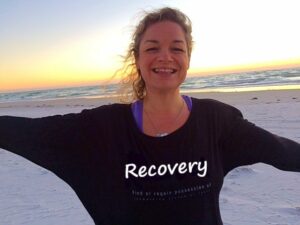
 As many people are looking forward to a three-day weekend, some food addicts are dreading attending food-centered picnics and events. Newly-recovered food addicts and even those who have been in recovery for years, can sometimes be reluctant to attend events where there is a lot of food. This is normal and understandable.
As many people are looking forward to a three-day weekend, some food addicts are dreading attending food-centered picnics and events. Newly-recovered food addicts and even those who have been in recovery for years, can sometimes be reluctant to attend events where there is a lot of food. This is normal and understandable.
Oftentimes food addicts can get so caught up in trying to please everyone else that they forget to stop and think about what they need. It’s okay to opt out of a holiday picnic or event where they’ll be a lot of food. It’s perfectly acceptable to choose a less-food centered way to celebrate the upcoming holiday such as going to the beach, spending time in nature or going for a hike. And, it’s even okay to decide not to recognize the holiday at all.
Opting out of gatherings that have the potential to trigger a relapse is not only a smart thing to do, it’s necessary for long-term recovery. At times, certain holidays or people can cause deep emotional reactions or extreme stress due to family dynamics or old behavior patterns that trigger binge behaviors. As recovering food addicts, it’s important to avoid people, places and things that are associated with overeating, addictive habits.
The important thing is for the decision to be based on healthy, recovery actions rather than obligation. In other words, it’s important for each food addict to figure out his or her needs and honor them. For some, attending holiday events is okay as long as they pack their own abstinent meal. For others, spending the time in a different way doing something they like will work better. Whatever you decide, I hope you enjoy the day!


 There’s still time! Summer’s not over yet! Even if you can’t get away for a week, take a day or even an hour to enjoy the sunshine this upcoming week. The last week of August traditionally marks the end of summer as do the upcoming American Labor Day and Canadian Labour Day holidays.
There’s still time! Summer’s not over yet! Even if you can’t get away for a week, take a day or even an hour to enjoy the sunshine this upcoming week. The last week of August traditionally marks the end of summer as do the upcoming American Labor Day and Canadian Labour Day holidays. Willing to go to any lengths for recovery. This is the beginning of long-term food addiction recovery. Many food addicts who call our offices or come to our events, are often shocked by the idea of weighing and measuring their food. Some even criticize this as promoting a “diet mentality” or as being “overly rigid” or “encouraging food obsession.” While many food addicts who were reluctant to weigh and measure their food in the beginning have thought these things, almost all of them have come to understand the value and reasoning behind this concept.
Willing to go to any lengths for recovery. This is the beginning of long-term food addiction recovery. Many food addicts who call our offices or come to our events, are often shocked by the idea of weighing and measuring their food. Some even criticize this as promoting a “diet mentality” or as being “overly rigid” or “encouraging food obsession.” While many food addicts who were reluctant to weigh and measure their food in the beginning have thought these things, almost all of them have come to understand the value and reasoning behind this concept.
 What a great 3 days! We were in Boston this week. In addition to enjoying the beautiful city, we had an amazing 3-Day program with some of our alumni. As recovery continues, life happens, and sometimes food addicts need extra support to work through tricky issues.
What a great 3 days! We were in Boston this week. In addition to enjoying the beautiful city, we had an amazing 3-Day program with some of our alumni. As recovery continues, life happens, and sometimes food addicts need extra support to work through tricky issues.
 It’s summer and it’s all about Farmers Markets! Next week is
It’s summer and it’s all about Farmers Markets! Next week is 
 What a week it’s been! We just finished up our July
What a week it’s been! We just finished up our July